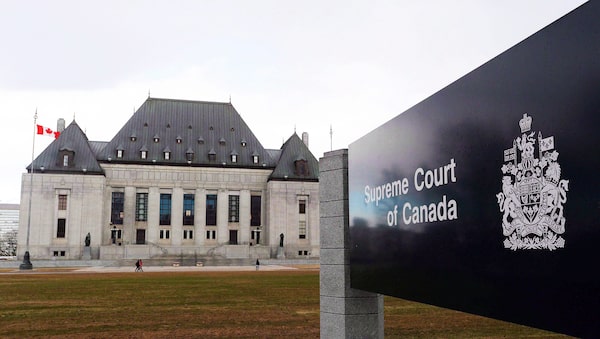
The Supreme Court of Canada in Ottawa on April 14, 2015. In 1988, the Supreme Court of Canada struck down our criminal abortion restrictions in the case of R v. Morgentaler.Sean Kilpatrick/The Canadian Press
Joanna Erdman is an associate professor and the MacBain Chair in Health Law and Policy at Dalhousie University’s Schulich School of Law.
On Monday night, the news site Politico published a leaked draft opinion by U.S. Supreme Court Justice Samuel Alito signalling that the country’s highest court plans to overturn the 1973 decision of Roe v. Wade. In the opinion, the majority of judges declared that the U.S. Constitution no longer protected the right to abortion – and that it never did.
The news alarmed Canadians who value their abortion rights. Are we safe? Are we next? Can it happen here? But abortion rights in Canada are rooted in a different legal structure. Canada has no abortion law, no statute that regulates acts taken with intent to end a pregnancy. This means Canada has no criminal code provisions on abortion (a fact that Justice Alito noted in his opinion). In 1988, the Supreme Court of Canada struck down our criminal abortion restrictions in the case of R v. Morgentaler – effectively our version of Roe v. Wade. Yet, unlike its U.S. counterpart, Canada’s Supreme Court did not suggest any elaborate rules of legislative action. Abortion rights were all that remained. Although Roe is cited by the Canadian court in R. v. Morgentaler, our abortion rights are cut from a different cloth.
The circulated U.S. draft opinion focuses on whether Roe is good law. Its answer is no. “Roe was egregiously wrong from the start,” Justice Alito writes. Why? Because the right to abortion, the majority argued, cannot be found in the text of the U.S. Constitution, including as part of the liberty rights of the 14th Amendment’s due process clause. Justice Alito criticizes Roe as having merely “expressed ‘the feeling’” that this amendment protected such a right. Against this feeling, he elaborates on why the right to abortion cannot fall within the category of a fundamental right, which includes only those rights “deeply rooted in American history and tradition.” We must be careful, he says, not to confuse what the Constitution does protect with Americans’ own views about the liberty that they should enjoy. In short, the majority cautions Americans to respect the teachings of history.
In Canada, our Constitution runs from root to branch. It is read through the doctrine of the living tree, by which we interpret the text of the Charter – our constitutional rights – in a broad and progressive manner that acknowledges that we change and evolve. As a result, our rights are meaningful, not obsolete. Morgentaler is a good judgment, but if there was to be a Canadian Supreme Court judgment on abortion rights today, it would likely read differently. Charter equality rights would take a more central role: abortion rights as linked to equality and justice in social and economic life. Justice Alito dismissed that idea in a single paragraph.
The seed for such a Canadian judgment on abortion rights was actually written in R. v. Morgentaler. At the time, then-justice Bertha Wilson concurred with the court’s plurality, and wrote her opinion in the name of liberty. She began with what she identified as the fundamental questions of the case: Can an individual, as a constitutional matter, be compelled by criminal law to carry a pregnancy to term? Can the state give away to another something that a person has a right to decide for themselves?
Most significantly – especially in today’s context – the then-justice placed this right of reproductive freedom at the heart of our democratic political tradition, a precondition of legitimate government no less than the most traditional of our civil and political rights: the right to choose one’s own religion and philosophy of life, the right to choose with whom one will associate and how to express oneself, and the right to choose where to live and what occupation to pursue. She asked: Do our constitutional rights not guarantee to every individual freedom over important decisions affecting their lives? Should not our liberty right then be broad enough to encompass the decision of whether to continue or end a pregnancy? This decision often carries profound psychological, economic and social consequences, she explained, and deeply reflects the way a person thinks of oneself and their relationships to others and to society at large. Indeed, our Constitution protects what liberties Canadians should enjoy.
The abortion right is thus at the heart of the Canadian constitutional state. In 1988, Bertha Wilson did the work to put it there and, for her work, our abortion rights are strong. She did not return the abortion issue to the state; she returned it to people – the people who need and have abortions. We trust in them, as we can trust in our constitutional history and tradition.
Keep your Opinions sharp and informed. Get the Opinion newsletter. Sign up today.